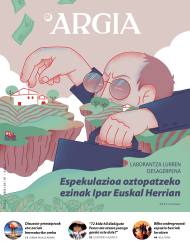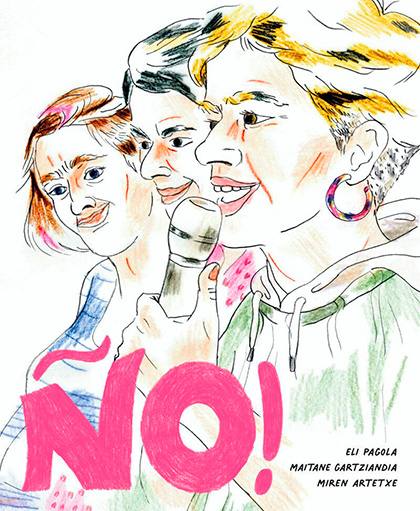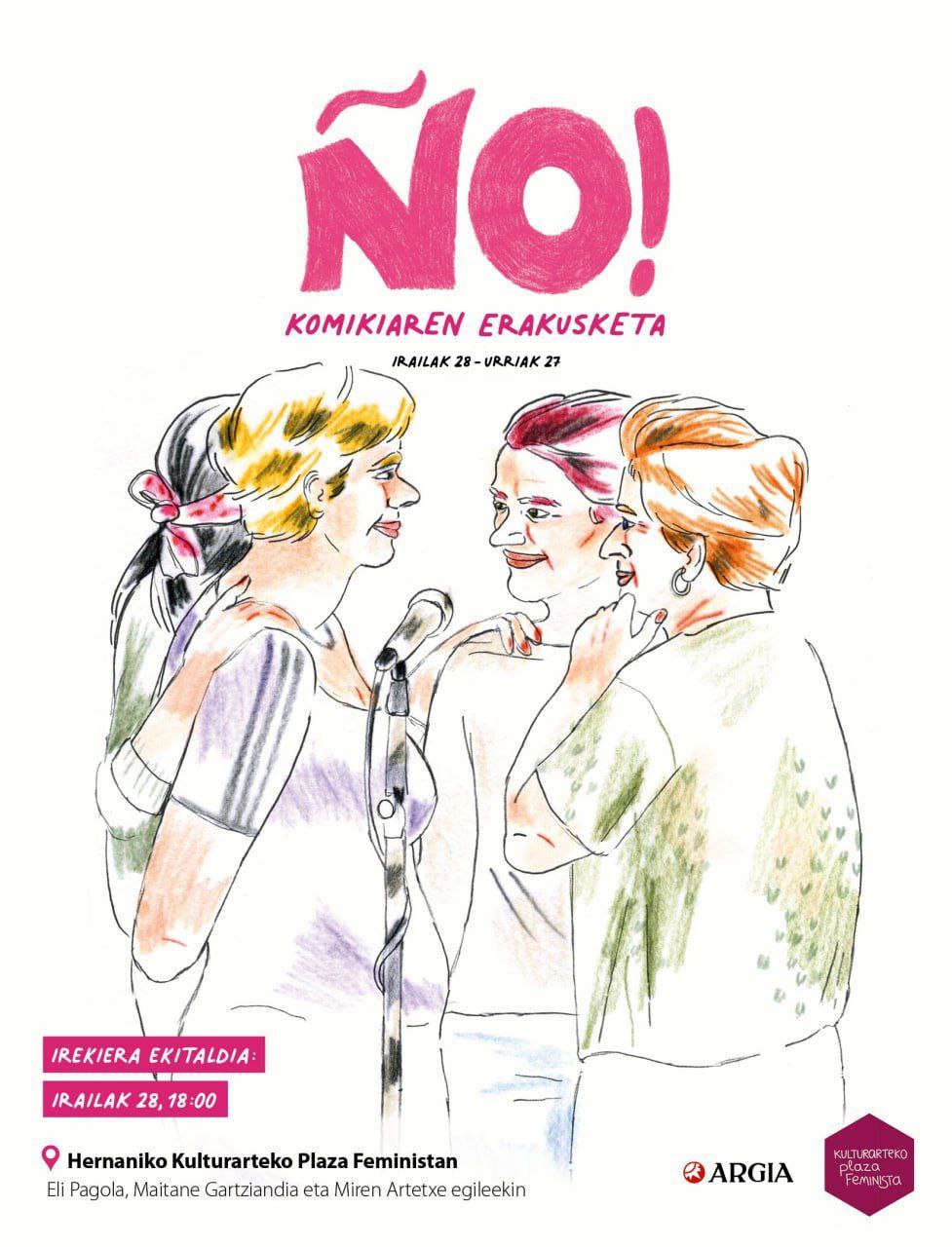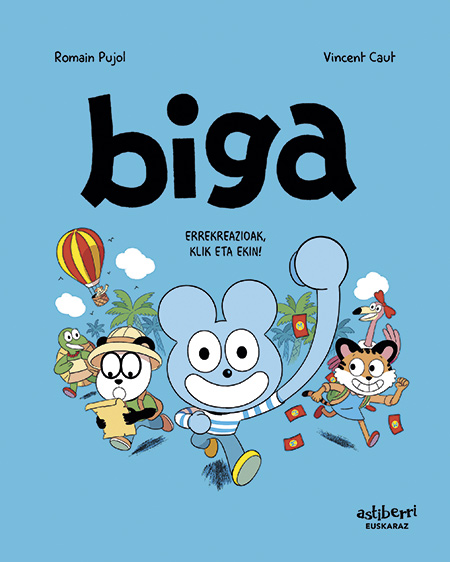"I'm not an artist, I'm an artisan, I like to do things and get it right."
- In the early 1980s, he published his first papers in Ipurbeltz magazine. Later came Habeko Mik. Justin Hiriart, Sorgin's sign, Simon Besaluze..., was approved by Muro Harriet before ditxos approval was invented... After working in audiovisuals, it was portrayed, founded the editorial Harriet and created this golden age of comic in Basque.

Gregorio Muro Harriet. Hernani, 1954
He began publishing comics in Ipurbeltz and Habeko Mik journals in the 1980s. This is the case of Justin Hiriart, Jon and Mirka and Sorgin. They were very successful in Basque and were translated into several foreign languages, even in Europe. He then worked in audiovisuals until in 2015 he created the editorial Harriet and began to publish successively the fantastic comics: Lotsa and forgetfulness, Dragons de la Frontera, Anker… In the audiovisuals you can see in the network Harrieten Who holds the most, an exciting work of animation, the first Oscar candidate in Basque. It has received several awards and merits.
They say you are the godfather of the comic book in Basque…
Comic book godfather in Basque? I am not Basque either! Chance has brought me here. I'm a little filmmaker since I'm a kid, a lot of movies. In Hernani there was a theater of the parish, with the name of Honradez and that of our father as a projection. My childhood era is Cinema Paradiso! All I did is watch movies, and I also wanted to make movies, but it wasn't a way, because in us there's no money. In the village there was a child who had a tomabist and gave me immense envy. When they opened the library in the village, and there I first saw a Tintin, all in color, I loved it! The comic, for me, was film, but on paper. And soon I started making comics, drawing as I could, or repairing, at age nine.
You started drawing.
But I'm not a cartoonist. I learned to draw in some way, because of the need to have things with images. And today, I'm not a cartoonist either, and although I've done a lot of scripts, I don't consider myself a writer, because he doesn't master literary language. I master audiovisual language, yes, the relationship between image and word, the world of image, text and substate.
You say you're not a cartoonist, but you started publishing the Ipurbeltz comics and you had the drawings you had. Iker and Ixone are witnesses.
Iker and Ixone… it’s where it is! 1978, my first job! When I found out that the publisher Erein pulled out Ipurbeltz, I took Iker and Ixone and went to Julen Lizundia, who was the publisher's head. I wasn't a cartoonist, I said, but I brought him the comic, the drawings made by me. I didn't have Euskara in my head, I just wanted to do comic books, live comics. Of course, there was no form, I hadn't even thought, but I liked telling stories with images, and there I started. The thing is, Erein published my work. Then, one day I received the call of Julen [Lizundia]: “Your drawings are not bad…”, it started, and it took me serious, what I was going to say, “...but your scripts are very good. What do you think of writing scripts for anyone?” “Yes, of course,” I replied. And so I started writing the story for Fructuoso, [Daniel] Redondo and others cartoonists.
And after that beginning, how did your beautiful comics come in? Justin Hiriart, The Witch Sign… Bestsellers!
When he was with Erein in Ipurbeltz, they organized the first comic room in Barcelona. “Come on us too,” Fructuosok said. We were aware that publishing in Basque could not pay more than then, and that the way was to publish our work in another language, if we wanted to make a living by making comics. We were the first to think that way, the pioneers! May 1981. And we went to Barcelona, we showed our works, and all the editors and editorials sent us to bury the goose.
Look, they disregarded their work!
At least not at that time! But when we were at the bar, an Argentine cartoonist came to us. He apparently made a presentation at a bookstore and met Fructuoso. So he saw us in the bar, Fruitful, and he stood with us. Juan Jiménez, recently arrived in Barcelona from Mendoza (Argentina), contained a fully made comic book album. He did not intend to return to his country, he wanted to stay in the Spanish state and live in comics.
And?
And? He asked us for help: “I have a quote with a French editor, but I don’t know anything French, neither he nor even Castilian. How does someone help me?” “I know so much in French, give it up,” I said. And we were both. It was Glenat editor, and I had a very small editorial, but today I have a terrible monster. I helped him. I remember Juan's [Gimenez] album was called The Black Star, a 46-page science fiction story. Show Giménez and buy Glenat! It did. We, at the time, made 8-10 page stories in Ipurbeltz!
.jpg)
There are no 40-page albums.
No! And I remember that night talking at the hotel, Fructuoso and I, and I said, "That's what we have to do, too, the album! I have two stories in my head, one from science fiction, Jon and Mirka, and one from whalers.” Fructuoso didn't have science fiction, he didn't like it. “The most whaler!” he decided. We were in May, and I told Fructuoso, "Now I'm going to start working on the whaling script, to start making drawings. In January it is a fair in Angulema and see if we can already show the album.” And in 1982, we completed 15 pages and we also built the cover of the comic book Justin Hiriart, which shows the tail of the whale, and we went to Angulema. And before anyone else, we went to Glenat, which we met the year before, and as soon as he saw it he said yes. So we started.
Then there were several titles, many of them very welcome.
After Justin Hiriart came Jon and Mirka with the drawings of Daniel Redondo. And then Sorgin's sign, also with Redondo's drawings. It was also in French and was a bestseller with over 70,000 units sold. The sweat of the sun, with the illustrations of [José Manuel] Mata; Simon Besaluze, with Luis Astrain… He was moving forward. I started publishing Habeko Mik, and that also helped me a lot, because I had the opportunity to do larger projects than I did with Erein. But along the way, I stayed alone. One worked as a professor, another started working on Spanish television… The cartoonists who worked with me stopped drawing comics.
"Comic book is sold, but in moderation. That is, not enough to hold a professional author. Therefore, we must carry out exportable works”
And when did you stay alone?
I started in audiovisual. I worked at Irusoin and Asegarce-Bainet. Indeed, then I realized: he was creator, this and he was thanks to the Basque! I think he owed to the Basque. I am not Basque, I am not Basque. Once, I tried to learn Basque, I signed up to Hernani’s AEK, but it was time to work in France giving everything, I don’t know what wind stuck with me, and I wasn’t able to do both things at once: write the scripts correctly and learn a language. I lived in distress and stopped studying in Basque.
He says mercilessly that he is not Basque, that he does not know Euskera, and that, however, he should be creative to the Basque...
Of course, on that. There's just and it's doing things. If you do nothing, you will never grow. The same applies to his founding status. And I've done it thanks to the Basque. I once said, “I am not Basque, but I will always try for the Basque, because the Basque has given me more than a lot.” And it is. There is no more.
He worked in audiovisuals, hid himself from comedy in Basque, but returned to comics in 2015, founding the publisher.
In 2012, a cartoonist told me he wanted to do comics again. “Let’s go to Angulema!” he. I said yes and we went. But I went to waste my time, no more, and yet I was talking to Glenat, and he told me that he wanted to get a job in French, the sweat of the Sun. “Great!” I said. Afterwards, we went to the comic book room in Barcelona, where I was still working at Bainet doing short films, and there, talking to the friends of always, the publisher Ponent Mon told me that he wanted to take the same comic in Spanish. And then he said, "I'm going to be in the Getxo comic market. Come? You know, the usual thing, cater to shoppers, sign comics...” I didn't say no.
And at the Getxo comic book fair...
The old readers came to me, my work at Habeko Mik or elsewhere. And all of a sudden, getting back to the readers was exciting, they reminded me of the pretty times of the past, maybe the nicest times in history, and in that, when I was about to retire, I decided not to stand still when I retire, to do things: "I'll go back to the comic book, but now, editor!" And it wasn't easy, but I founded my own editorial.
Since 2017, the Basque Government has awarded scholarships to create comics. He was the promoter of these scholarships…
I proposed it. When I was dedicated to audiovisuals, I often made my requests for subsidy, both to help write the script, and to make a short and sometimes a feature film. The Basque Government provided various aid to support audiovisual media. Nothing to drive the comic. Joxean Muñoz was then Deputy Minister of Culture of the Government. Muñoz is a comic book that knows what we're talking about when we talk about comics. Because many don't know what the current comic book is. I told him that we needed subsidies to create comics, that in the Spanish state it generated more than 100 million euros, among other things through taxes, and that it was legitimate to invest some of the taxes it generated in the comic book itself, for example, by creating grants for creators.
And so the present scholarships came up.
It wasn't that easy. It was 2016, and all the games were oriented to San Sebastian [European Capital of Culture]. Joxean Muñoz told me that once we had that, we would talk and that, on the other hand, it had to be a demand from the sector, not just me. Logical. And I collected the sector: the publisher Astiberri, the magazine Xabiroi, and the three. And reiterate demand and obstacles, and this and that. I remember Astiberri’s representative saying, “We are not going to get it!” And I said, "We have to endure: a battle is not lost until it is abandoned." It was time, but from time to time I met Joxean Muñoz, at the San Sebastian Film Festival or elsewhere, and he always told him that they had to help the comic book: “The Basque Government – or the deputies, I don’t care – raises money at the expense of the comic book, but it doesn’t return anything in return.” I think he also got bored to hear the same thing, and one day he set up a meeting, got the industry together and told us yes. And they started scholarships for creators.
.jpg)
You're also a creator, an experienced writer, editor and entrepreneur. All at once you!
They say that need is a big engine, and it's true. I don't think I'm an artist, not at least a special person levitating a while above the earth. I'm not an artist, I'm an artisan, I like to do things and do things well. It is. On the other hand, I need to sell what I do to be able to live from what I do and, finally, I feel like or empathy to help others so that they can live from what they do. There is no more. And that necessarily leads me to do a lot of things. And if I don't know, I learn them.
"In Ipurbeltz I went to Barcelona and from there to Angulema. And I realized the way and along the way I met people."
How have you learned all of them? Make scripts, edit comics, publish, sell on local and foreign markets...
The path itself has taught me, the same path I have made. Being in Ipurbeltz, I went to Barcelona and from there to Angulema. And I realized the road, and along the way I met people. Very important, meeting people. Now, go to a fair, go to some young editors and don't know me. But there is always Jacques Glenat! I have his personal phone, we met 40 years ago, and when one sees the other, he always faces: “Here are the Basques!” And we started selling and buying comics.
Meet people…
Something very important, I told you. I met another editor, also French, who sold the editorial for gold and bought the rugby team. As I know, he's back in the edition, he's occupied a great publisher and he's publishing comics. We are also juerga and I have open doors, I have greater facilities to reach it than anyone else. I've walked the road, the road itself has taught me, no secrets.
* * * * * * *
Selling comics “Yes, comic book is sold, but as far as possible, not as large as to hold a professional author. That is why I always say that we have to make exportable works. There
are readers in Euskera, yes, but, although many, they are not enough. Imagine the case of a comic book that has sold 1,200 copies. If you have a price of 16 euros, and 10% is for the author, you will receive 1,800 euros… in payment of one year of work! Without scholarships from the Basque Government and without selling comic book rights abroad, there is no way.”
“We are animals and gregarious, but there are
also alpha males among us. In other words, there will always be someone who commands, necessarily. Because no one commands that is utopia. And on the other hand, power corrupts the person and absolute power corrupts it absolutely. I believe that power must always be controlled, questioned, monitored. And that thought is in my comics, in silence, in subtlety, but there, and that thought leaves a mark, makes the reader think.”
Last word
Enjoy
“Since I have professionalized, my reading gaze has changed, I don’t enjoy as much as before. I am aware of the subject, of this and of its analysis and criticism, which prevents me from enjoying reading. It’s barbaric, but it’s true.”
Bildumako azken alea izango dela jakinarazi dute: lehenbizikoa Ni-ari buruzkoa izan zen, eta bigarrena Zu. Bigarren hura bezala, autoedizioan kaleratu du honakoa ere.
Ño!
Texts: Illustrations Eli Pagola and Miren
Artetxe: Luz Maitane
Gartziandia, 2023
------------------------------------------------------
Before and after the comic, both on the skin and back provided, as well as inside tapas and tapas, there are images and words... [+]
Biga (5 books)
Screenplay: Illustrations Romain
Pujol: Vincent Seguros
Astiberri
----------------------------------------------------
We've read eleven stories at home to our seven- and nine-year-olds, and I would say that I've never seen them so hooked that with the... [+]
Screenplay
Anker: Gregorio muro harriet
Illustrations: Alex Male
Color: Garluk Aguirre
Harriet, 2023
The Anker comic is located in January 2019. In the Russian regions, near the borders of China and North Korea. It shows the mafias that are flourishing the Siberian... [+]

























